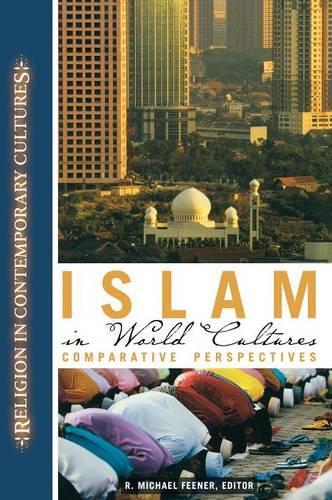
Islam in World Cultures: Comparative Perspectives
(Hardback)
Publishing Details
Islam in World Cultures: Comparative Perspectives
By (Author) R. Michael Feener
Bloomsbury Publishing PLC
ABC-CLIO
26th October 2004
United States
Classifications
General
Non Fiction
Cultural studies
297
Physical Properties
Hardback
387
Description
Islam in World Cultures analyzes differences in Islamic culture and practice by looking not simply at matters of doctrine, but also at how Islam interacts with local cultures. Are Muslim states ready for democracy Is there a culture war between the West and 1.2 billion Muslims As the United States wages war in Iraq, academics, the media, and politicians are asking these questions. But does it make sense to discuss Islam as a monolith Islam in World Cultures says no. Contemporary treatments of Islam focus on the Middle East; they treat the beliefs and people of that region as representing all of Islam. At most they emphasize the differences between Muslim groups-Sunni vs. Shia, for instance-while overlooking the even greater differences that result from region-specific cultural and political pressures. Islam in World Cultures gathers the work of ten eminent scholars, each of whom has expertise in the Muslim culture of a particular country or geographical area. Individual chapters explore contemporary developments in the Islamic experience in Turkey, Iran, Pakistan, Central Asia, China, Indonesia, South Africa, Ethiopia, and the United States. This broad treatment provides an introduction to the full range of issues relating to Islam in the context of globalization.
Reviews
"This distinctive work offers ten well-written, scholarly essays about various regions of the world and their Islamic cultures. It is intended for general audiences ... Recommended. Undergraduates seeking a broad introduction to the dynamics of Islam in the modern world." - Choice "As with other titles in this series, the strength of this volume is in its analysis of how Islam interacts with global and local cultures. ... appropriate for advanced high school students or undergraduates." - VOYA "An excellent resource for understanding not only the various political and cultural issues associated with contemporary Islamic communities around the world, but also the historical conditions responsible for the distinct and fascinating variations found in their religious practices." - American Reference Books Annual
Author Bio
R. Michael Feener is assistant professor of religious studies at the University of California, Riverside, CA.
